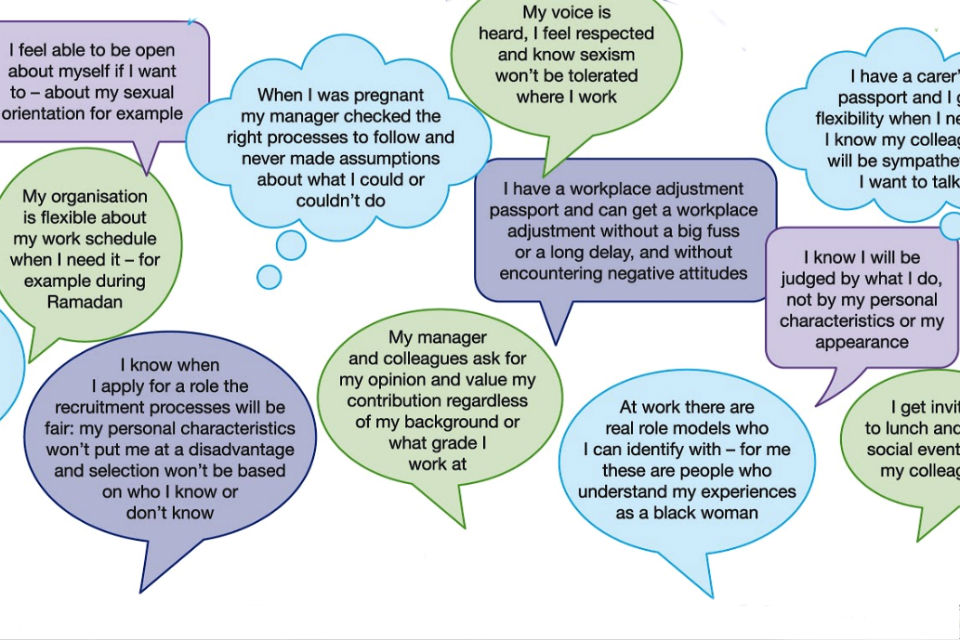
Two weeks ago, we published our new Civil Service Diversity and Inclusion Strategy – a strategy we can all be proud of, that stretches our ambition and sets actions that will enable us to become the UK’s most inclusive employer by 2020.
On the day of the launch, I posted a blog and asked an important question - “How will you make your workplace more inclusive?”
From the comments on this blog, and from the extensive research and engagement we did to develop the strategy, it is clear that each of us has our own perception of what diversity and inclusion actually means, based on our personal experiences and circumstances. Some of your comments provided good challenge, with some questioning whether the strategy was relevant to you and whether the approach we took in developing the strategy was itself inclusive. I am actually encouraged by this – it means we’ve created exactly the right sort of dialogue in an environment where it’s important and safe to speak up. Thank you for your feedback.
Traditionally, we have measured diversity, and our success in being diverse, by the representation of minority groups in our workplace. And we are improving. On this measure, the Civil Service is the most diverse it has ever been, though we are the first to hold our hands up and admit we need to do more.
Our research also made it clear that more needs to be done to create a stronger understanding that the breadth of diversity isn’t only about visible differences or protected characteristics, such as ethnicity, gender or disability. We know diversity comes in all manner of forms, often not visible and never as single issues – we all have a gender, an ethnicity, abilities or disabilities, a sexual orientation, a work pattern, and responsibilities outside work particular to each of us. We are all different. However, some of those differences are more likely to affect our chances of progressing in our careers, and have different impacts on our life chances.
Our new strategy recognises that diversity of personal circumstances (visible and non-visible) affects us all, and to feel the benefits of a truly diverse workforce we need to ensure we have an inclusive culture. If our diversity is the mix, then inclusion is making that mix work.

Inclusion feels different for everyone. Understanding different perceptions of inclusion is really important to us, and we spent a lot of time talking to civil servants across the country while we developed the strategy. At the Civil Service Live events this summer, hundreds of you gave valuable input, sharing your views and ideas and really importantly, your personal stories. These stories ranged from having the ability to access workplace adjustments easily, or being supported through a gender transition, to really simple acts like being asked to join a group for lunch or meetings being scheduled on different days to accommodate working patterns.
This staff feedback shaped the approach we have taken and the commitments laid out in the strategy, and we have started as we mean to go on. As one of the comments on my blog rightly pointed out, everyone – whether or not they belong to an underrepresented group – has a role to play in creating an inclusive environment. As well as embracing difference, we must all challenge ourselves to think about the way our own biases and behaviour affects those around us. At the same time, we must speak up when we don’t feel included, recognise and reward inclusive behaviours, and call out unfairness and discrimination whenever we see or hear it.
It is only right that I give my own answer to the question, How will you make your workplace more inclusive?. I have made Diversity & Inclusion one of my principal objectives and one of the top three priorities for the Civil Service as a whole. I personally mentor talented and enthusiastic civil servants from underrepresented groups – an experience I have found both fulfilling and valuable in giving me a different insight into the organisation I lead; while I hope my mentees have found my advice and guidance helpful, too.
In launching this strategy, I want to make it explicit that diversity and inclusion are key measures of effective leadership and management, and an essential element of delivering measurably fair and effective policies and services. I am looking to all our leaders and managers to share and deliver on this commitment.
So, with a small but important modification, I think it is fair to ask again: What can we all do to make our workplaces more inclusive?
Follow Sir Jeremy on Twitter: @HeadUKCivServ.

2 comments
Comment by Gavin Thomas posted on
In answer to your question about how would will I make my workplace more inclusive?
I have sought to achieve this by being an active member of the FCO Staff Association the Wellbeing Network and by attending the training the courses to become a Mental Health First Aider [MHFA England] and Stonewall LGBT Straight Ally.
Comment by Kevin Oliver posted on
Personally, I'm pleased to see that, in general terms, the word "Diversity" is being pensioned off. We know we're all different, now we have to learn how to learn from - and celebrate - our differences.
I'm also heartened to see "Fairness" being used more frequently. We need to be treating everyone fairly, and according to their needs. And " treating everyone the same" gets us nowhere.
I have something of a reputation for being an advocate of "Fairness" and think that the way forward is to pursue this. We are, after all, each a minority of one.